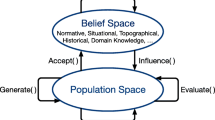Abstract
A cultural algorithm, together with a set of new operators for the timetabling problem(TP), is proposed in this paper. The new operators extract information about the problem during the evolutionary process, and they are combined with some previously proposed operators, in order to improve the performance of the algorithm. The proposed algorithm is tested with a benchmark of 20 instances, and compared with respect to three other algorithms: two evolutionary algorithms and a simulated annealing algorithm which won an international competition on TP.
Partially supported by CONACYT/CONICYT Collaboration Project México-Chile No. J110.331/2005 and Fondecyt Project 106377.
Preview
Unable to display preview. Download preview PDF.
Similar content being viewed by others
References
Chung, C.-J., Reynolds, R.G.: CAEP: An Evolution-based Tool for Real-Valued Function Optimization using Cultural Algorithms. Journal on Artificial Intelligence Tools 7(3), 239–292 (1998)
Coello, C.A., Landa, R.: Adding knowledge and efficient data structures to evolutionary programming: A cultural algorithm for constrained optimization. In: Proceedings GECCO, pp. 201–209. MK Publishers (2002)
Cordeau, J.F., Jaumard, B., Morales, R.: Efficient timetabling solution with tabu search. International Timetabling Competition (2003)
Durham, W.H.: Co-evolution: Genes, Culture, and Human Diversity. Stanford University Press, Stanford (1994)
Eiben, A.E., Hinterding, R., Michalewicz, Z.: Parameter Control in Evolutionary Algorithms. IEEE Transactions on Evolutionary Computation 3(2), 124–141 (2000)
Franklin, B., Bergerman, M.: Cultural algorithms: Concepts and experiments. In: Proceedings of the 2000 Congress on Evolutionary Computation, pp. 1245–1251. IEEE Service Center, Piscataway (2000)
Algorithmic Solutions Software GmbH. Leda 5.1 (2006), http://www.algorithmic-solutions.com
Kostuch, P.: Timetabling competition - sa-based heuristic. International Timetabling Competition (2003)
Lewis, R., Paechter, B.: New crossover operators for timetabling with evolutionary algorithms. In: 5th International Conference on Recent Advances in Soft Computing (RASC 2004), pp. 189–195 (2004)
Metaheuristics Network. International timetabling competition (2003), http://www.idsia.ch/Files/ttcomp2002/ Last access: December 2006
Reynolds, R.G.: An Introduction to Cultural Algorithms. In: Sebald, A.V., Fogel, L.J. (eds.) Proceedings of the Third Annual Conference on Evolutionary Programming, pp. 131–139. World Scientific, River Edge (1994)
Richerson, P.J., Boyd, R.: Not By Genes Alone: How Culture Transformed Human Evolution. University Of Chicago Press, Chicago (Dec. 2004)
Rossi-Doria, O., Paechter, B.: A memetic algorithm for university course timetabling. In: Proceedings of Combinatorial Optimisation (CO’2004), School of Computing, Napier University, Scotland (2004)
Rothlauf, F.: Representations for Genetic and Evolutionary Algorithms. Physica-Verlag, New York (2002)
Socha, K., Sampels, M., Manfrin, M.: Ant algorithms for the university course timetabling problem with regard to the state-of-the-art. In: Raidl, G.R., Cagnoni, S., Cardalda, J.J.R., Corne, D.W., Gottlieb, J., Guillot, A., Hart, E., Johnson, C.G., Marchiori, E., Meyer, J.-A., Middendorf, M. (eds.) EvoIASP 2003, EvoWorkshops 2003, EvoSTIM 2003, EvoROB/EvoRobot 2003, EvoCOP 2003, EvoBIO 2003, and EvoMUSART 2003. LNCS, vol. 2611, pp. 334–345. Springer, Heidelberg (2003)
Soza, C., Riff, M.C., Landa, R.: Towards a cultural algorithm to solve timetabling problems. In: The Fifth ALIO/EURO conference, Paris (October 2005)
Author information
Authors and Affiliations
Editor information
Rights and permissions
Copyright information
© 2007 Springer Berlin Heidelberg
About this paper
Cite this paper
Soza, C., Landa, R., Riff, M.C., Coello, C. (2007). A Cultural Algorithm with Operator Parameters Control for Solving Timetabling Problems. In: Melin, P., Castillo, O., Aguilar, L.T., Kacprzyk, J., Pedrycz, W. (eds) Foundations of Fuzzy Logic and Soft Computing. IFSA 2007. Lecture Notes in Computer Science(), vol 4529. Springer, Berlin, Heidelberg. https://doi.org/10.1007/978-3-540-72950-1_79
Download citation
DOI: https://doi.org/10.1007/978-3-540-72950-1_79
Publisher Name: Springer, Berlin, Heidelberg
Print ISBN: 978-3-540-72917-4
Online ISBN: 978-3-540-72950-1
eBook Packages: Computer ScienceComputer Science (R0)




